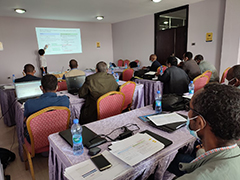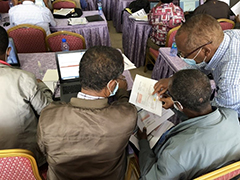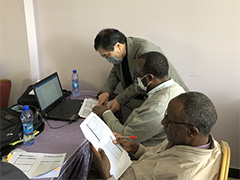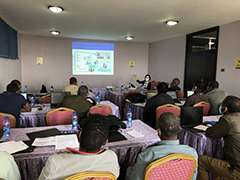Math Textbook Developers from Four National Universities Participated in MUST Workshop Revision of Draft 1 Textbooks for Grades 9 to 12
2022.02.27
A three-day MUST [1] Workshop with mathematics textbook developers for grades 9 to 12 was conducted by MoE/JICA-MUST Project in Addis Ababa from 25 to 27 February 2022, where about 14 mathematics textbook developers from Hawassa, Bahir Dar, Jimma and Addis Ababa Universities participated.
The Ministry of Education (MoE) is in the process of revising the textbooks for all subjects and all grades from primary to secondary schools by March 2023. The purpose of this workshop was to support the mathematics textbook developers for grades 9-12 to improve their final drafts further and share a timetable of activities proposed by MUST to finalize the draft textbooks by March 2023.
There are two main issues regarding the draft version of secondary mathematics textbooks. One is that units are not structured in a way that students can immediately exercise what they just learned in the class. Lack of immediate exercises clearly makes it difficult for students to understand a new concept or acquire a new skill introduced in the lesson. To overcome this problem, MUST Japanese experts have proposed the standard structure of "A (Activity)-D (Definition)-E (Example)-E (Exercise)" be applied to each lesson. The second issue is that problems given as Examples and Exercises are too difficult for most of the students. We have proposed making the problems more basic and simpler. These two adjustments have been termed as "unitization." The textbook developers worked on the "unitization" of their drafts in this workshop.
At the beginning of the workshop, MUST experts pointed out those two issues and gave details on why well-structured textbooks would improve quality of students' learning. Also, it was explained that structured teaching would ensure adequate time for students to be engaged in learning and for teachers to provide feedback to students.
The workshop went on to explain the five steps for improving the quality of the draft textbooks: 1) Correction of mistakes; 2) Improvement in layout, mathematical expressions, terms, graphs, figures, etc.; 3) Improvement of the structure of A-D-E-E by particularly applying the "1 topic, 1-2 pages" principle; 4) Modification of problems at the right level of students' learning; and 5) Improvement/enrichment of the contents. The first two steps were previously dealt with in a workshop held by MoE/JICA-MUST in October 2021. This time, textbook developers worked on the last three steps. With respect to step 3 and step 4 in particular, MUST experts presented some "unitized" units as examples to facilitate their work. The textbook developers diligently worked on the "unitization" incorporating comments and modifying the draft referring to the examples.
After the workshop, the textbook developers are expected to continue "unitization" with all the remaining units in the draft textbooks for G9-12. In April 2022, MoE will check the validity of the revised draft textbooks. Once they are validated, they will be printed and distributed to the 98 pilot schools throughout Ethiopia. In September 2022, monitoring and evaluation (M&E) of the new textbooks will start in the pilot schools. MoE is planning to revise and finalize the piloted textbooks based on the results of M&E by March 2023.
Note
[1] Mathematical Understanding for Science and Technology

JICA advisor explains what "Unitization"
is and how to work on "Unitization".

The textbook developers work on
"Unitization".

MUST team leader gives advice on
"Unitization" to the participants.

Deputy team leader of MUST explains
why well-structured textbooks would
improve quality of students' learning.
scroll